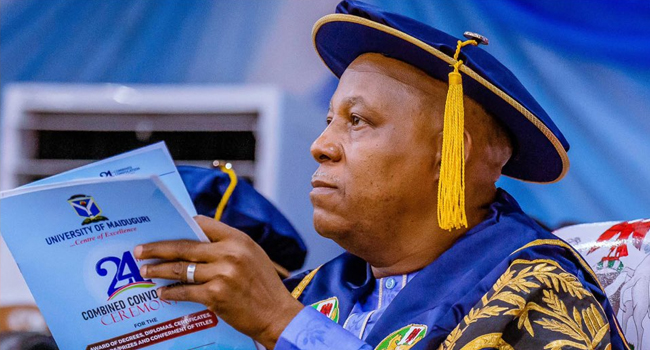Vice President Kashim Shettima has urged for the cessation of using strikes as a method of expressing grievances against the government.
He spoke while representing the visitor, President Bola Tinubu, at the 24th joint convocation of the University of Maiduguri (UNIMAID) in Borno State.
“It is no longer fashionable to insist on confrontation as a tool for demanding improved welfare conditions for your members,” he said on Saturday.
“Incessant strikes are very detrimental to the system and so the option for dialogue must remain paramount in resolving any issue or crisis.”
He emphasized that the Federal Government is consistently prepared to engage in discussions with unions across the country to address labor-related concerns.
The Vice President also advocated for collective contributions to fund the nation’s education system, emphasizing that the government cannot shoulder the responsibility alone.
Shettima, alongside three distinguished Nigerians, received an honorary doctorate degree from the university, which has been conducting its inaugural convocation since the 2018/2019 academic session.
‘Start an Enterprise’
At the University of Maiduguri Convocation:
VP @officialSKSM Inspires Graduands, Harps On Education As Service To Humanity
Bags Honorary Doctorate Degree
The University of Maiduguri was on Saturday enveloped in a frenzy of academic recollection as Vice President Kashim Shettima… pic.twitter.com/ThTtns59VX
— Presidency Nigeria (@NGRPresident) November 18, 2023
During the event, the university’s Vice Chancellor, Prof. Aliyu Shugaba, urged the graduating students to embrace entrepreneurship.
“Every success in life brings with it challenges. You are graduating today, our nation is faced with myriads of problems. I believe the university has adequately prepared you to contribute to proffering solutions to these problems,” he said.
“The era when graduates look up to the government for answers to all problems is fast fading. I encourage you to specifically utilize your entrepreneurial training in the university to decide your employability status. Start an enterprise, no matter how small your capital or idea is.”
More than thirty-three thousand students received certificates from the university, with one hundred and forty-seven achieving first-class honors.
A detailed breakdown of the graduating students reveals that eight hundred and seventeen earned master’s degrees, and one hundred and thirteen attained PhDs. The remaining students obtained their first degrees from the main university and affiliated colleges.



